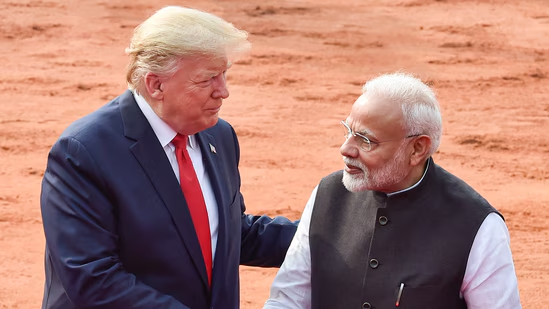
‘Punchline: Trump’s reaffirmation of ties with Modi in the UK was more than a personal gesture—it was a strategic signal that the India-U.S. trade deal could define the future of global economic diplomacy.
During his visit to the United Kingdom, U.S. President Donald Trump underlined his close relationship with Indian Prime Minister Narendra Modi, a remark that comes at a pivotal moment as both nations are engaged in delicate India-U.S. trade negotiations. Speaking after he meets with UK Prime Minister Keir Starmer at Chequers, Trump noted that he was “very close to PM Modi” and had recently extended birthday greetings to him over a phone call. His statement instantly made headlines, with many viewing it as a reaffirmation of the strength of the India-U.S. partnership despite ongoing challenges.
Diplomatic Signaling
Trump’s warm words are more than personal pleasantries—they serve as a deliberate diplomatic signal. By emphasizing his rapport with PM Modi, Trump sought to reassure both domestic and international observers that the U.S.-India relationship remains strong despite frictions over tariffs, market access, and energy imports. This personal connection, often showcased during Trump’s political career, has been a hallmark of his foreign relations style. For India, such gestures carry symbolic weight as they reflect Washington’s acknowledgment of New Delhi as a key global player.
Trade Talks in Focus
The backdrop to Trump’s comments is the current round of India-U.S. trade talks, which remain one of the most watched aspects of bilateral ties. The two countries have faced disagreements over tariffs imposed on Indian exports, India’s continued energy imports from Russia, agricultural market access, and issues relating to intellectual property rights, digital taxation, and data localization. While Trump acknowledged these challenges, he expressed optimism that both nations were making progress. Indian Commerce Minister Piyush Goyal has also echoed confidence, stating that trade disputes would be “addressed satisfactorily” and described bilateral relations as “positive and forward-looking.” His remarks highlight the government’s optimism that a breakthrough is within reach.
Balancing Praise and Pressure
Interestingly, while India-U.S. trade deal Trump reaffirmed his closeness to PM Modi, he also defended the U.S.’s decision to impose sanctions and tariffs on Indian goods. Reports indicate that Washington is considering easing some tariff measures to foster goodwill in negotiations. This dual approach—praising India’s leadership while maintaining pressure on trade fronts—illustrates the balancing act the U.S. is attempting in its economic diplomacy with India. By maintaining a mix of praise and pressure, Trump aims to keep negotiations alive while protecting U.S. domestic economic interests. For India, this approach is a reminder that personal rapport must still navigate hard economic realities.
Why It Matters
India is a crucial partner for the U.S., both economically and strategically. As the world’s most populous democracy and a rapidly growing economy, India represents a vital market and a counterweight to Chinese influence in the Indo-Pacific region. For Trump, reaffirming closeness with Modi is also about signaling unity at a time when the global order is shifting, with both nations facing challenges such as global supply chain disruptions, energy security, and regional instability. For India, maintaining a strong relationship with Washington is key not only for trade but also for defense cooperation, technology transfer, climate commitments, clean energy initiatives, and global diplomacy. The India-U.S. trade deal under discussion is therefore more than a commercial agreement—it is a building block for deeper strategic ties.
Reactions from Analysts
Foreign policy experts have noted that Trump’s language reflects a pattern in his diplomacy where personal chemistry with world leaders is used to advance negotiations. While skeptics argue that such words may not always translate into policy concessions, others believe that Trump’s repeated emphasis on being “very close to PM Modi” creates a favorable atmosphere for resolving disputes.
Analysts in India have also pointed out that Modi’s government sees this as an opportunity to secure better market access for Indian exporters, particularly in sectors like textiles, IT services, engineering goods, and pharmaceuticals. American analysts, meanwhile, see the talks as a chance to push for greater access for U.S. agricultural and dairy products in Indian markets.
Global Context
The timing of Trump’s remarks is also significant in the broader geopolitical context. With the U.S. recalibrating its stance on China and emphasizing stronger partnerships in the Indo-Pacific, India’s role as a strategic ally has only grown. Both nations are also working together in forums such as the Quad alliance (along with Japan and Australia), highlighting how economic ties are interlinked with security partnerships. Trump’s words in the UK thus carried not just bilateral meaning but also global significance, projecting India-U.S. unity to the world.
Looking Ahead
As trade talks continue, the tone set by Trump’s remarks could pave the way for greater flexibility and cooperation. The relationship, however, will depend on whether both sides can bridge their differences on tariffs, digital trade rules, labor standards, and energy policies. If successful, the negotiations may result in a landmark India-U.S. trade deal that strengthens India-U.S. economic ties and reinforces their strategic partnership. However, if disagreements persist, symbolic closeness may not be enough to prevent economic friction from overshadowing diplomatic goodwill.
Trump’s declaration of being “very close to PM Modi” in the UK may be symbolic, but symbols often carry weight in international diplomacy. The India-U.S. trade talks now stand at a crossroads where personal rapport, strategic interests, and economic realities must converge. If both nations can convert warm words into actionable agreements, the outcome could mark a turning point in bilateral relations and set the foundation for a stronger partnership in the decades ahead.
FOR MORE BLOGS – beyondthepunchlines.com

 Add to favorites
Add to favorites





